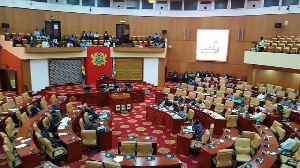- Home - News
- Polls
- Year In Review
- News Archive
- Crime & Punishment
- Politics
- Regional
- Editorial
- Health
- Ghanaians Abroad
- Tabloid
- Africa
- Religion
- Election 2020
- Coronavirus
- Photo Archives
- News Headlines
- Press Release
General News of Saturday, 17 October 2020
Source: happyghana.com
Replacing Husbands in Parliament" Male MPs must be careful – Lawyer advises
Lawyer Dr. Kwadwo Addo Tuffuor has asserted that male members of the Ghanaian parliament might have to watch their backs as the new trend of wives replacing them in parliament upon their deaths is almost being ‘institutionalized’.
In an interview with Samuel Eshun on the Happy Morning Show, he said: “I saw on a page that women will start killing their husbands who are in parliament in order to succeed them”.
According to him, this is in vogue now as in recent times, the wives of MP’s have been replacing them immediately after their demise. To him, this trend might give some women the motive to murder their MP husbands.
From 2016 till date, most members of parliament who have died were immediately replaced by their spouses.
The precedence for the trend was when Linda Obenewaa Akweley Ocloo was elected by the opposition National Democratic Congress (NDC) to step into the shoes of her late husband, Desmond William Ocloo, who was representing the NDC as their Parliamentary candidate for Shai Osudoku immediately after his death in an unfortunate road traffic accident in May 2016 in Juaso in the Asante Akyem South District of the Ashanti Region.
Lydia Seyram Alhassan who is currently the MP for Ayawaso West Wuogon is also known to have succeeded her late husband Emmanuel Kyeremateng Agyarko who died as a sitting MP for the constituency in January 2019.
The latest of such replacements happened in the Mfantseman Constituency where the ruling NPP only this week settled on Ophelia Hayford the wife of Ekow Quansah Hayford, the MP who was murdered by some unknown assailants on Friday to run for the Mfantseman constituency on the party’s ticket.
Many political analysts are of the view that the political parties opted for the wives of these deceased MPs in the bid to gain some sympathy votes from their respective constituencies. But others have advised these political parties to rather consider party members who contested in the primaries in these constituencies to fill the gaps created.
He argued that this movement, however, seems to be causing some fear and concern to male members of parliament so they’ll remain wide-awake to observe whether or not this trend continues so action can be taken immediately.
Entertainment










